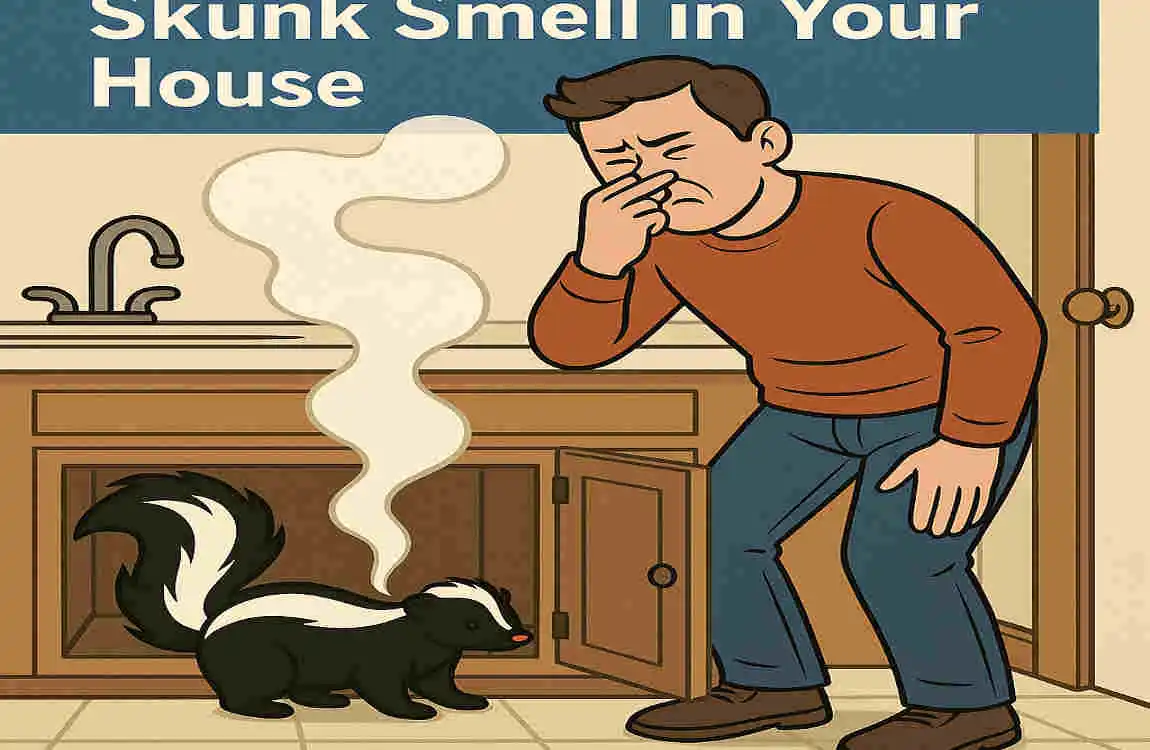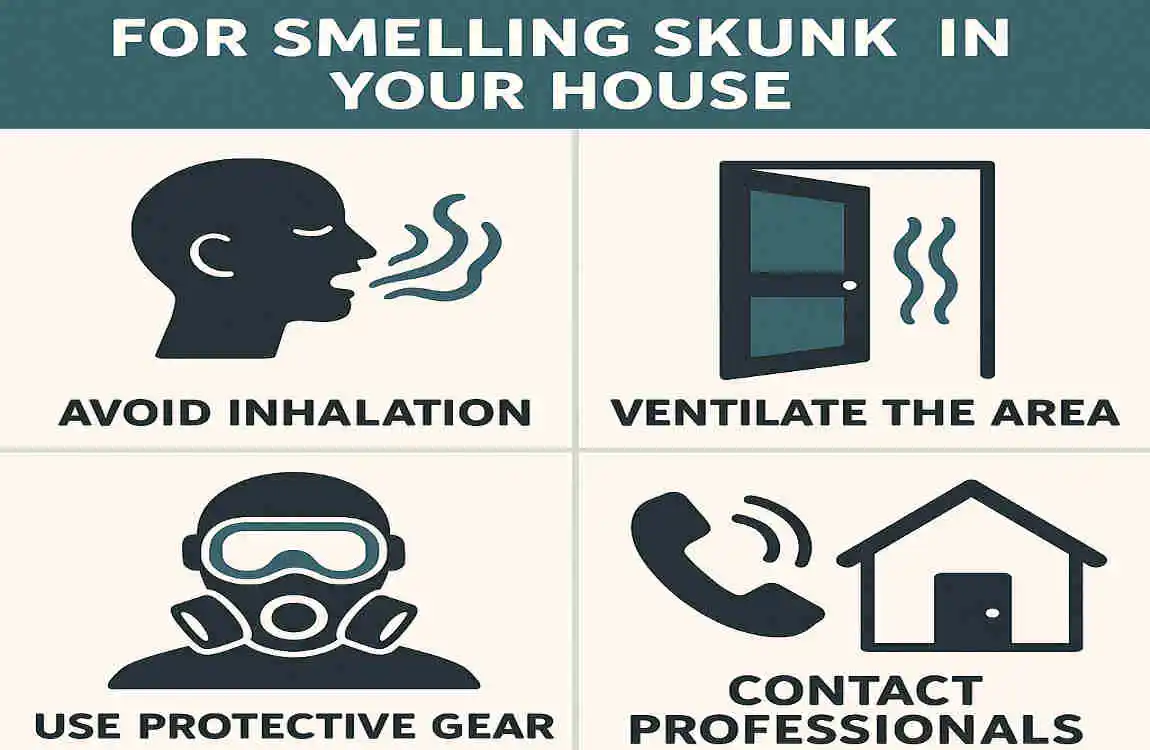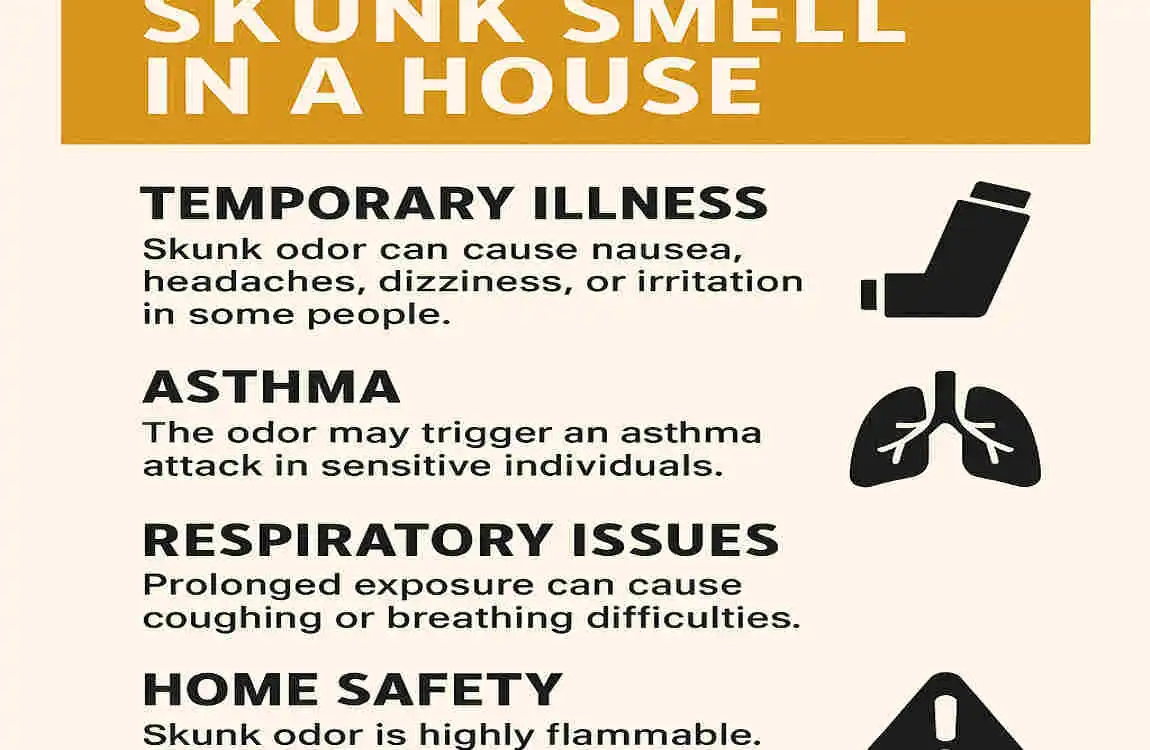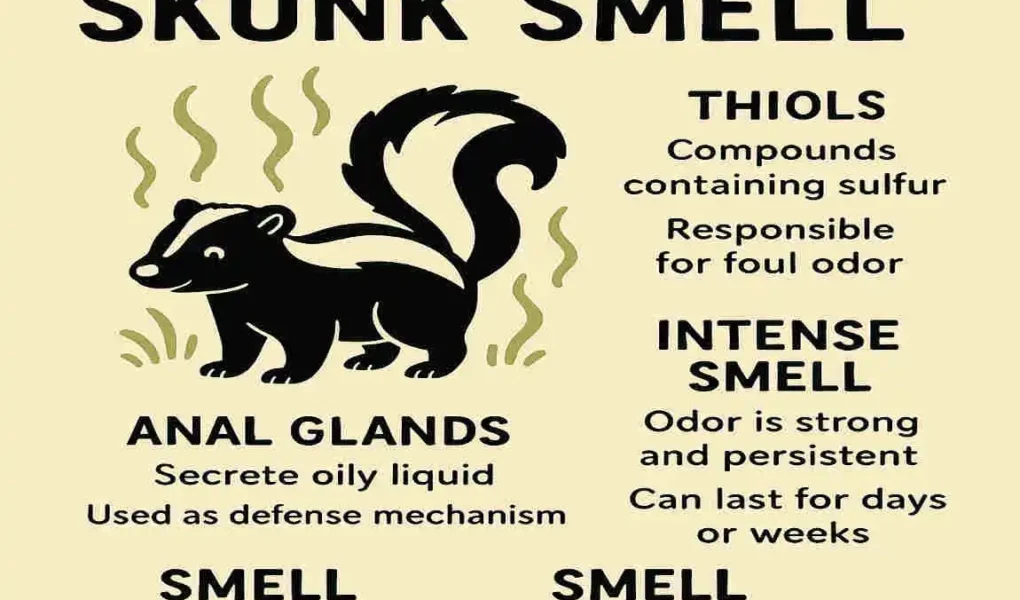A skunk smell in your house can come from several sources, such as a nearby skunk spraying close to your home, a skunk hiding under your porch or yard, or even the smell entering through open windows or cracks. The distinctive odor is caused by sulfur compounds in the skunk’s spray, which can cling to surfaces and be challenging to remove. Additionally, smells similar to skunk odor can be caused by gas leaks, dead animals in walls or vents, or sewer gas from house plumbing issues, so identifying the exact cause is important for safety and effective removal.
Understanding Skunk Smell

Before tackling the odor, let’s understand what makes skunk spray so potent and problematic. This knowledge will help you approach the situation more effectively.
What Causes Skunk Smell: Biology of Skunks and Their Spray
Skunks are fascinating creatures with an incredibly effective defense mechanism. When threatened, they release a powerful spray from two glands located near their tail. This spray can travel up to 10-12 feet with remarkable accuracy.
The skunk’s ability to spray isn’t unlimited. They typically carry enough liquid for about five or six sprays, and it takes approximately 10 days to replenish their supply. This is why skunks give warning signs before spraying – they’d rather save their ammunition for true emergencies.
Chemical Composition of Skunk Spray
The secret behind the overwhelming stench lies in the spray’s chemical makeup. Skunk spray contains thiols (also called mercaptans), which are sulfur-based compounds. These chemicals are similar to those found in garlic and onions but are far more concentrated.
The main components include:
- Butyl mercaptan
- Methyl mercaptan
- Skunk thioacetates
These compounds bind to proteins in your nose, which explains why the smell seems to get stronger over time and why it’s so difficult to eliminate.
How Potent and Persistent Is the Smell
The human nose can detect skunk spray at concentrations as low as 10 parts per billion. To put this in perspective, that’s like detecting a single drop of the substance in an Olympic-sized swimming pool!
The smell can persist because:
- Thiols are oil-based, making them water-resistant
- They bind strongly to organic materials
- The compounds can reactivate when exposed to water
- They penetrate deep into porous surfaces
Why the Smell Is So Hard to Remove
Traditional cleaning methods often fail against skunk odor. Water alone actually makes the smell worse by reactivating dormant thioacetates. Regular soap doesn’t break down the oil-based compounds effectively.
The persistence comes from the spray’s ability to:
- Penetrate fabrics and porous materials deeply
- Resist standard cleaning products
- Spread through air circulation systems
- Reactivate in humid conditions
Common Misconceptions About Skunk Odor
Let’s clear up some myths about skunk smell:
Myth 1: Tomato juice eliminates skunk odor
Truth: It only masks the smell temporarily
Myth 2: The smell will go away on its own quickly
Truth: Without treatment, it can linger for months
Myth 3: Skunks spray randomly
Truth: They only spray when threatened and give warnings first
Common Reasons You May Smell Skunk in Your House
Understanding why you’re experiencing skunk smell in your house is the first step toward solving the problem. Here are the most common scenarios:
Skunk Sprayed Directly Near or Inside the House
This is often the most obvious cause. Skunks may spray near your home when:
- Startled by motion-sensor lights
- Confronted by pets or other wildlife
- Defending their territory or young
- Feeling trapped near doorways or windows
Even if the spray occurs outside, the powerful odor can seep through the smallest openings and permeate your entire home.
Skunks Taking Shelter Under or Inside Homes
Skunks are opportunistic when it comes to finding shelter. They often seek refuge in:
- Crawl spaces under porches or decks
- Sheds and outbuildings
- Hollow spaces beneath concrete steps
- Attics or wall voids (though less common)
When skunks establish a den near your home, their natural musky odor – even without spraying – can become noticeable indoors.
Skunk Spray on Pets or Belongings Brought Inside
One of the most common ways skunk smell enters homes is through our beloved pets. Dogs, being naturally curious, often investigate skunks and receive a face full of spray for their trouble.
The odor transfers when:
- Pets run inside after being sprayed
- You handle contaminated pets without protection
- Pet bedding or toys become contaminated
- Clothing or shoes pick up spray residue
Dead Skunk in or Near Property Causing Odor
A deceased skunk can create an ongoing odor problem. The smell from decomposition combines with any spray released at death, creating a particularly unpleasant situation.
Common locations include:
- Under decks or porches
- In wall voids or attics
- Near foundation walls
- In window wells
Skunks Attracted to Garbage or Pet Food Around the House
Skunks are omnivores with hearty appetites. They’re drawn to:
- Unsecured garbage cans
- Pet food left outside
- Compost piles
- Bird feeders (they eat fallen seeds)
- Grubs and insects in lawns
These food sources bring skunks close to your home, increasing the likelihood of spray incidents.
How Season and Environment Affect Skunk Behavior and Incidents
Skunk activity varies throughout the year:
Spring (February-May): Mating season brings increased movement and territorial behavior. Males travel widely seeking mates, leading to more encounters.
Summer (June-August): Mother skunks with babies are highly defensive. Young skunks learning to spray may do so more readily.
Fall (September-November): Skunks actively forage to build fat reserves for winter, bringing them into yards more frequently.
Winter (December-January): While not true hibernators, skunks become less active. However, they may seek warm shelter near homes.
How Skunk Smell Enters Your House

Understanding the pathways skunk odor takes into your home helps you address the problem more effectively. The smell can infiltrate through various routes:
Air Circulation and Open Doors/Windows
The most direct route for skunk smell is through open airways. Even with windows and doors closed, the odor can enter through:
- Window screens (which don’t block odor molecules)
- Door gaps and weatherstripping failures
- Fresh air intakes for heating/cooling systems
- Bathroom and kitchen exhaust fans running in reverse
During warm weather, when windows are open for ventilation, skunk smell can quickly fill your entire home.
Cracks, Vents, and Attic Access Points
Your home has numerous small openings that allow air – and odors – to enter:
Foundation cracks: Even hairline cracks allow odor molecules to pass through
Utility penetrations: Where pipes and wires enter the home
Soffit vents: Designed for attic ventilation but can allow odors in
Ridge vents: Another attic ventilation point
Chimney gaps: Especially if the damper is open
Pet Fur and Clothing as Carriers
Skunk spray oils cling tenaciously to organic materials. When contaminated items enter your home, they bring the smell with them:
- Pet fur holds the oils even after initial washing
- Clothing fibers trap odor molecules deeply
- Shoes can track in contaminated soil
- Hair and skin absorb the spray compounds
Carpets, Furniture, and Fabrics Absorbing the Smell
Once inside, skunk odor quickly spreads to absorbent materials:
Carpets and rugs trap odor molecules in their fibers
Upholstered furniture absorbs the smell deeply
Curtains and drapes act like odor sponges
Clothing in closets can pick up the smell from air circulation
HVAC System Spreading the Odor Throughout the House
Your heating and cooling system can be your worst enemy when dealing with skunk smell. The system:
- Pulls contaminated air through return vents
- Spreads the odor to every room with supply vents
- Traps odor molecules in filters and ductwork
- Recirculates the smell continuously
Identifying the Source of Skunk Smell in Your House

Pinpointing where the skunk smell originates helps you target your cleaning efforts effectively. Here’s how to track down the source:
Visual Signs to Look For: Skunk Tracks, Spray Residue
Start your investigation by looking for physical evidence:
Skunk tracks show five toes with claw marks, about 2-3 inches long. Check:
- Soft soil around the foundation
- Dusty areas in basements or crawl spaces
- Snow in winter months
Spray residue appears as:
- Yellowish oily stains on walls or siding
- Wet spots on concrete or wood
- Discolored areas on outdoor furniture
Smell Intensity and Location Patterns Inside the House
The strongest odor concentration usually indicates the entry point. Map out where the smell is:
- Most intense (likely nearest to the source)
- Moderate (adjacent areas)
- Faint (furthest rooms)
Pay special attention to:
- Rooms with exterior walls
- Areas near HVAC vents
- Basements and crawl spaces
- Rooms where pets spend time
Checking Pet Behavior and Condition for Being Sprayed
Your pets can provide valuable clues:
Signs your pet was sprayed:
- Excessive drooling or foaming at the mouth
- Red, watery eyes
- Repeated sneezing or pawing at face
- Rolling on ground trying to remove smell
- Obvious odor concentrated on face/head area
Behavioral changes:
- Reluctance to go outside
- Hiding or acting unusually subdued
- Excessive grooming attempts
Using Professional Inspection if Necessary
Sometimes, finding the source requires expert help. Consider professional inspection when:
- The smell persists despite cleaning efforts
- You can’t locate any obvious source
- You suspect skunks living in your structure
- The odor seems to come from walls or inaccessible areas
When to Consider Professional Skunk Removal Services
Call wildlife control professionals if you:
- See skunks repeatedly on your property
- Hear scratching or movement sounds in walls/attic
- Find evidence of a den under your structure
- Notice damage to lawn from skunk foraging
- Have recurring smell issues
Health and Safety Considerations

While skunk spray is primarily a nuisance, there are health aspects to consider when dealing with skunk smell in your house.
Can Skunk Spray Be Harmful to Humans and Pets?
Skunk spray isn’t toxic in the traditional sense, but it can cause various uncomfortable reactions:
For humans:
- Temporary stinging or burning sensation in eyes
- Nausea and vomiting from the intense odor
- Headaches and dizziness
- Difficulty breathing in confined spaces
For pets:
- Severe eye irritation and temporary blindness
- Oral pain if spray enters mouth
- Skin irritation on sensitive areas
- Rare cases of anemia in dogs (from specific compounds)
Symptoms of Exposure to Skunk Odor
Direct spray exposure can cause:
- Immediate symptoms: Eye watering, burning sensation, temporary vision problems
- Respiratory effects: Coughing, throat irritation, difficulty breathing
- Skin reactions: Redness, itching, burning sensation
- Systemic effects: Nausea, headache, fatigue
Prolonged indoor exposure to skunk smell may lead to:
- Persistent headaches
- Loss of appetite
- Sleep disturbances
- Mood changes from stress
Allergic Reactions and Respiratory Irritations
Some individuals are particularly sensitive to skunk spray compounds:
High-risk groups include:
- People with asthma or COPD
- Those with chemical sensitivities
- Individuals with compromised immune systems
- Young children and elderly residents
Warning signs requiring medical attention:
- Severe breathing difficulties
- Persistent vomiting
- Extreme eye pain or vision changes
- Signs of allergic reaction (hives, swelling)
Safe Handling Precautions When Dealing with Skunk Smell
Protect yourself while cleaning:
Personal protective equipment:
- Rubber gloves (disposable preferred)
- Eye protection or goggles
- Old clothing you can discard
- Face mask to reduce odor inhalation
Safety practices:
- Work in well-ventilated areas
- Take frequent fresh air breaks
- Don’t mix cleaning chemicals
- Keep pets and children away during cleaning
- Wash hands thoroughly after handling contaminated items
When to Call a Professional

Sometimes DIY methods aren’t enough. Here’s when expert help is needed:
Signs the Problem Is Too Big to Handle Yourself
Consider professional help when:
Persistent odour issues:
- Smell returns after thorough cleaning
- Multiple rooms were severely affected
- Odour in walls or inaccessible areas
- HVAC system contamination
Active skunk presence:
- Skunks living under structures
- Multiple skunks on the property
- Aggressive or sick-appearing skunks
- Baby skunks present (indicates den)
What Professional Skunk Removal Services Offer
Wildlife control experts provide:
Assessment services:
- Complete property inspection
- Identification of all entry points
- Evaluation of attractants
- Risk assessment for future problems
Removal services:
- Humane trapping and relocation
- Exclusion barrier installation
- Den site cleanup and deodorising
- Dead skunk removal
Prevention services:
- Professional-grade repellent application
- Structural modifications
- Ongoing monitoring programs
- Warranty on exclusion work
Cost Considerations and What to Expect
Professional services vary in price:
Typical cost ranges:
- Basic inspection: $100-$200
- Single skunk removal: $200-$500
- Multiple skunks: $300-$800
- Exclusion work: $300-$1,500
- Odour remediation: $200-$1,000
Factors affecting cost:
- Number of skunks
- Accessibility of den sites
- Extent of exclusion needed
- Severity of odour problem
- Your geographic location
How to Find Reliable Wildlife Control Experts
Choose the right professional:
What to look for:
- Proper licensing and insurance
- Humane removal methods
- Written estimates and warranties
- Good online reviews
- Professional associations membership
Questions to ask:
- Experience with skunk problems
- Methods used for removal
- Warranty terms offered
- Timeline for service
- Prevention recommendations
How to Install a Home Electric Window: FAQ
What is an electric window?
An electric window is a window equipped with a motorized opener (actuator) that allows it to open and close automatically, often controlled by a switch, remote, or smart home system.
Can I install an electric window myself?
Yes, you can install an electric window yourself if you have basic DIY skills. However, for mains-powered electric window openers, it’s recommended to hire a qualified electrician to handle the wiring and ensure safety .
What tools and materials are needed?
You’ll typically need:
- A new electric window or actuator kit
- Screwdrivers, drill, and screws
- Measuring tape
- Level
- Wiring tools (if applicable)
- Sealant or caulk for weatherproofing .
What are the basic steps to install an electric window?
- Prepare the opening: Remove the old window (if replacing) and clean the frame. Ensure the opening is level and plumb .
- Install the window: Place the new window into the opening, secure it with screws, and check alignment .
- Connect the actuator: Attach the motorized opener to the window and frame as per the manufacturer’s instructions.
- Wire the system: For mains-powered systems, connect the wiring to the actuator. Ensure proper cable routing and safety compliance .
- Test the window: Power the system and test the opening/closing functionality.
- Seal and finish: Apply caulk or sealant around the window to prevent air or water leaks .
Do I need a professional for wiring?
Yes, for mains-powered electric windows, it’s crucial to hire a licensed electrician to ensure proper wiring and compliance with safety standards .
Are there smart home options for electric windows?
Yes, many electric windows can integrate with smart home systems, allowing you to control them via apps, voice commands, or automation.
What are the benefits of electric windows?
Electric windows offer convenience, improved ventilation, and accessibility, especially for hard-to-reach areas like skylights or high windows.




